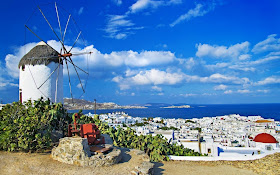Tomorrow is Greek Orthodox Easter. The simple answer for the
difference in the date used by Greeks and others of the Eastern Orthodox faith from
that followed by Protestants and Catholics is that the former calculate their
Easter based upon the Julian calendar while the latter use the modern Gregorian
calendar. If you want to know precisely
how the date is determined, check out this link
to my post a few years back around this time.
But no matter how the date is determined, Easter is by far
the main event in Eastern Orthodoxy. It
is preceded by more than a week of significant religious and cultural
observations. And on Mykonos, Easter
literally brings the island back to life.
In the winter, Mykonos is a sleepy island village with
virtually no tourists, no business, few open bars, fewer restaurants, and no
clubs. But come Easter Week everything
changes. Red and yellow springtime
poppies burst to life all over the island’s hillsides, and those and still more
varieties of flowers embroider the blanket of green covering the nearby holy
island of Delos. There are Church
services every day of Holy Week, as well as daily preparations for the feast to
come at the end. Breads and cookies are
readied on Monday and Tuesday, baking is done on Wednesday, and eggs are dyed
red on Thursday, the day before Christ was put up on the Cross.
By Thursday, Mykonos is filled with mainland Greeks flocking
to their vacation homes and others looking to participate in a perfect example
of spiritual and temporal coexistence: Easter church rituals strictly observed
during the day, followed by the island’s as nearly hallowed party traditions
through the night. But that taste of the
coming mid-summer craziness is short lived, for if you don’t catch the action
that weekend come by in June, because Mykonos is back in hibernation come
Tuesday.
Evening services on Good Friday start at seven in the old town’s
three main churches, Kiriake, Metropolis, and Panachra. At precisely nine, each church’s clergy and
worshipers leave their church in separate processions carrying their church’s epitaphios (the painted or embroidered
cloth representation of Christ on a bier elaborately adorned in spring flowers
and symbolizing his tomb) along a prearranged route, winding past the other two
churches before ending up back at their own to complete the service. It represents the funeral of Christ, and
Mykonians and visitors line the route, some standing on balconies and
sprinkling the participants below with a mixture of rose water and perfumes,
the rodhonoro used on Christ’s body
when taken down from the cross.
The same three churches serve as the scene of the following
night’s Holy Saturday services. Most
generally start heading off to church around ten, but for certain everyone is
there by midnight. For that is the high
point of Easter, when church bells ring out across Greece and even total
strangers exchange the traditional Christos
Anesti and Alithos Anesti
greetings that Christ has risen, kiss each other, and light each other’s
candles to share the light and joy of the occasion—a light brought to Greece
for just this purpose from the Holy Flame of Christ’s nativity cave in
Jerusalem. Worshipers carry the light
back into their homes or their favorite restaurants, except for the hearty
souls who remain in church for the balance of a service that lasts hours more
into the morning.
Now it is time to challenge each other with the customary
one-to-one smacking of those dyed-red eggs for good luck to the winner (mine
always cracks first) and devour the traditional mayiritsa soup (made from parts of a lamb you may ask me about if
you really want to know), fluffy tsoureki
easter bread, and salads to break the forty-day fast leading up to Easter.
But the big feast, the one everyone looks forward to, comes
on Sunday. That’s when all the work of
the week and all the spring lambs find their purpose. There is church, too, of course, but this day
is more about celebrating with family and friends. And eating.
Dieting starts Monday.
Kalo Paska
Jeff — Saturday




















































